Blog – May 6, 2025, Seventh Week Honors Seminar Prof. Dr. Florian Hörmann
Utopia?
Take a moment to go into yourself. Try and listen to your body, your mind — What are your needs? What makes you feel comfortable? What makes you feel at ease?
Try to picture a world, taking in all those factors, actively contributing to your wellbeing.
And now compare it with modern societies approach of what a future world might look like:
>> Google search:
…
And? Any discrepancies?
Maybe it is time that we start questioning our idea of an ‘high-tech future at all costs’ — take a step back, become aware of the impact this thinking already has on our society and build on a true Utopia.
And that’s exactly what we did in this week’s seminar!
Constructing Our Own Utopia
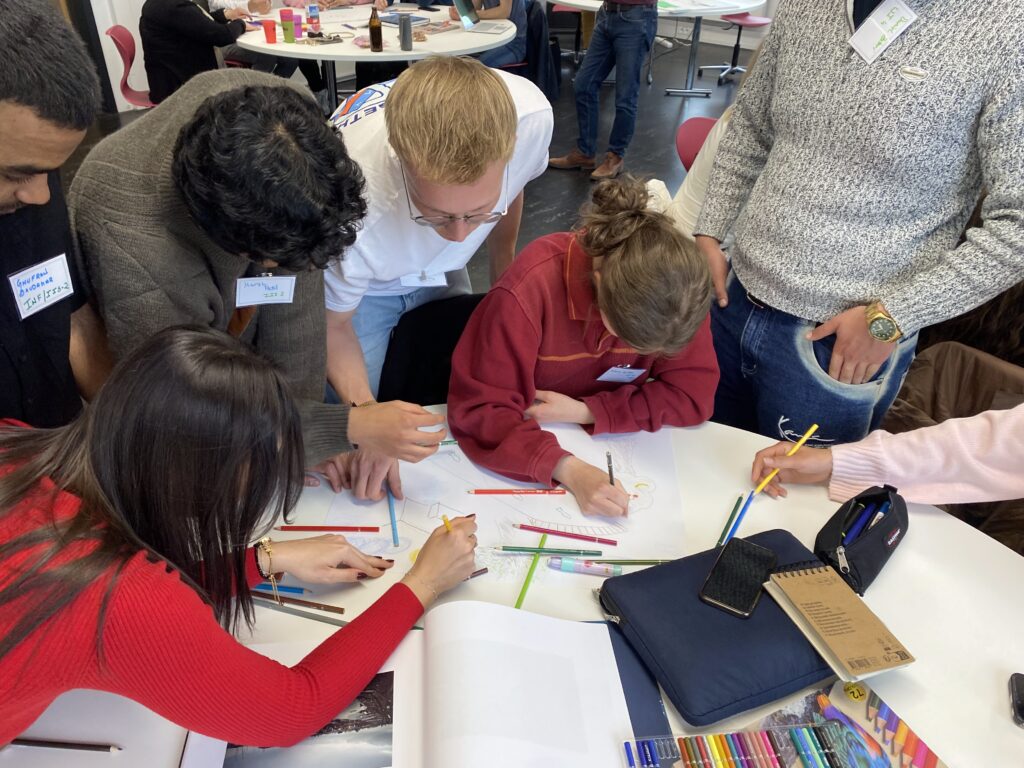
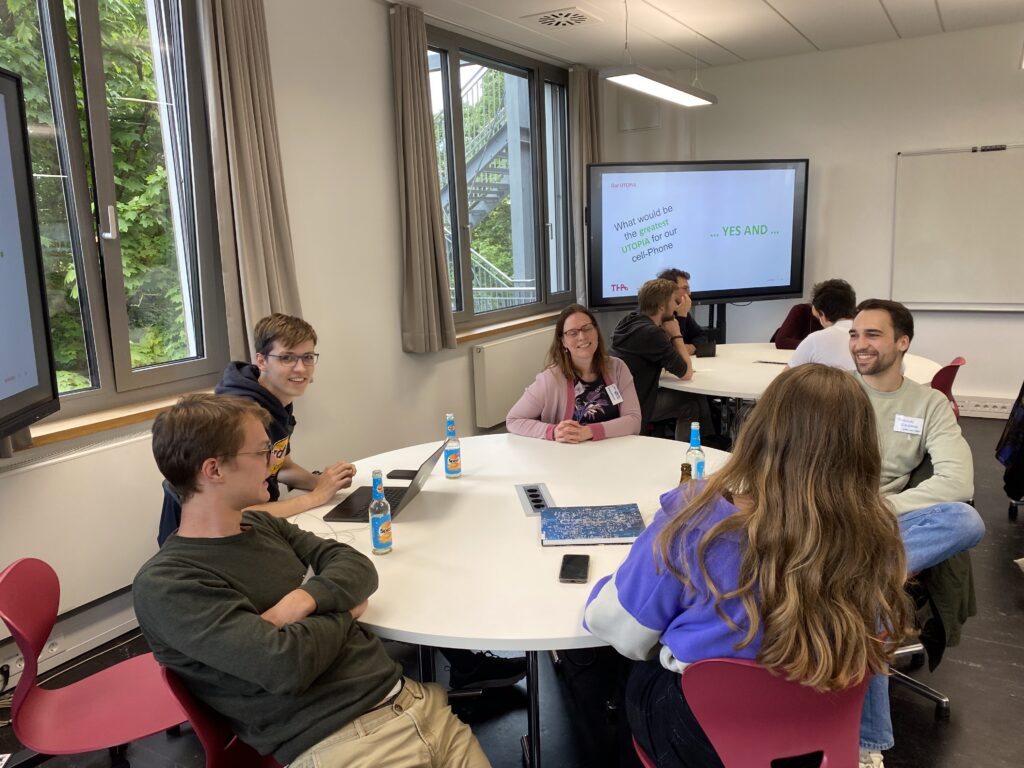
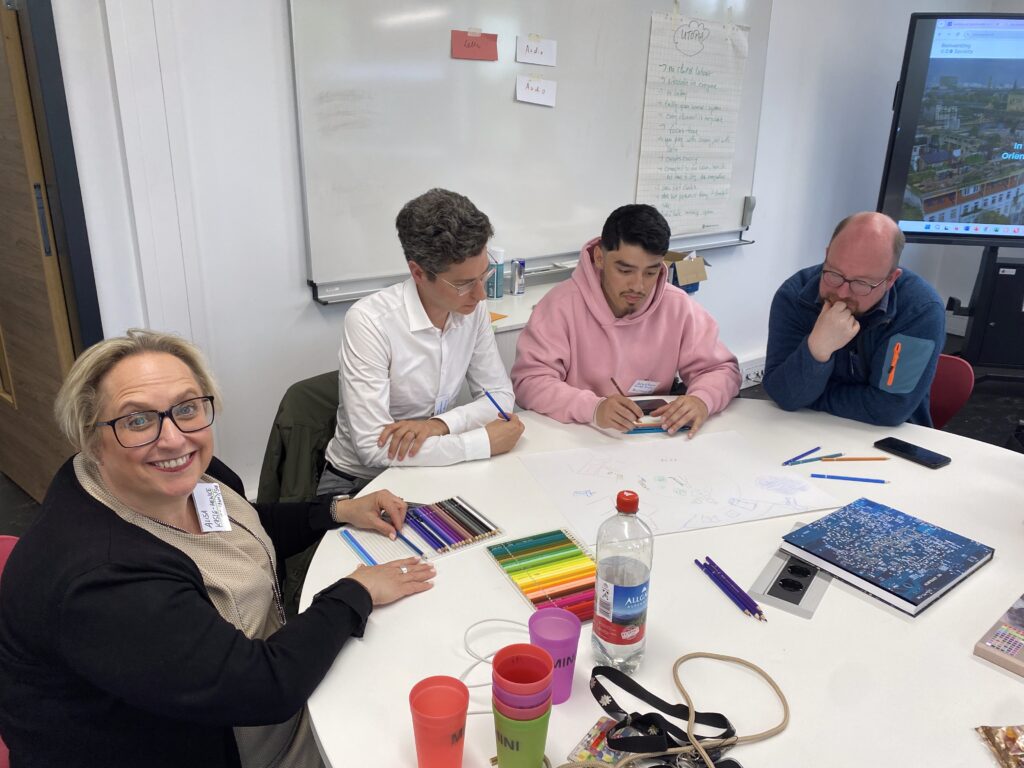
Is low-tech actually the new high-tech for achieving a better, more optimistic future? A bold question of guidance for this weeks seminar looking at the current technical developments. Self-driving cars, billions in investment of quantum computing and other high-tech innovations, and AI suddenly popping up everywhere — One thing is certain: Our current common mindset is primed on always wanting the best and most powerful tech or the most economic growth. But is this a sustainable way of thinking, being confronted with the big crises of our time?
The good old days of prosperity…
Prof. Dr. Florian Hörmann, chair of this weeks seminar, jokingly opened by showing us a clip from “The Flintstones” – a TV show about a stone age family as we would need to return to their level of technology to achieve true sustainability. Of course this was meant as a exaggeration, but as every hyperbole, it contained a basis of truth, setting the scene for the rest of the seminar.
A clip of the American State of the Union address, delivered by President Bill Clinton in the Year 2000 contrasted the unprecedented periods of peace and prosperity back then with what feels like the current stagnating state of the western world right now. A state of the world with all its problems, like wars, famine and climate change.
Now looking into the future, the decision has to be made: How do we want to get out of this state? And what kind of future do we want to turn out of it?
Because YES!
➨ A better world — sustainable and just — is possible.
➨ However, it does not arise spontaneously.
➨ We can and have to create and shape it ourselves.
The often overlooked side of technology…
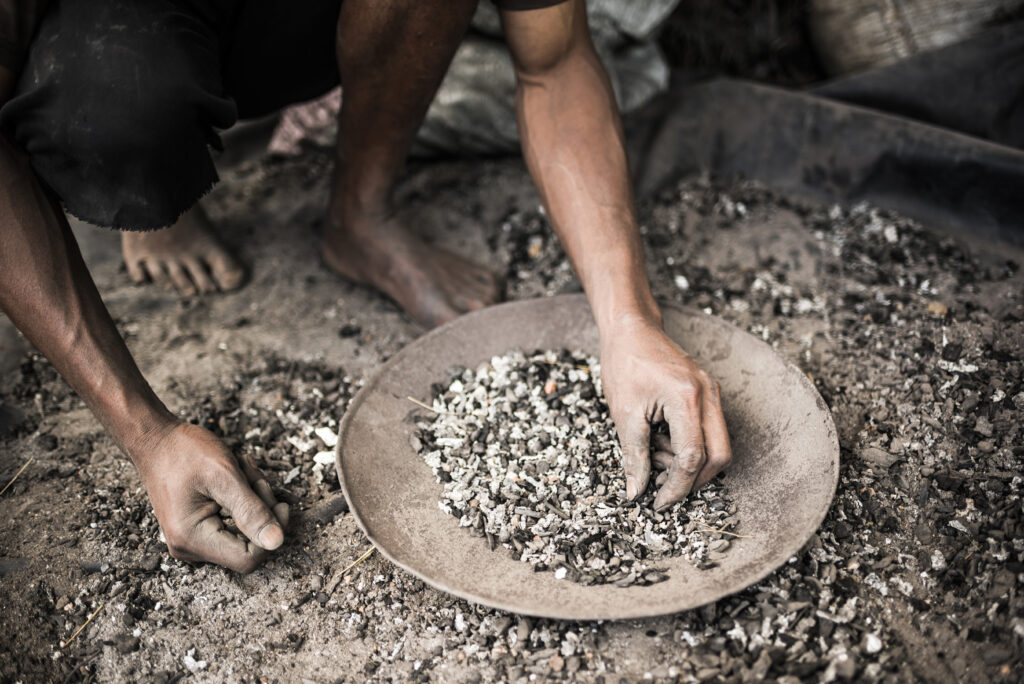
During the lesson we got confronted with a more narrow slice of the problems facing our world primed on technological growth: Florian gave us a book called “CTRL-X”. In it there was a collection of pictures taken amongst different places in the third world, being utterly littered by broken or otherwise discarded electronics. Also shown are people having to work at these landfills risking their health disassembling what we just throw away as rubbish, not really questioning what happens afterwards. Quite unsettling!
So how can we change this? How can we go from throwaway tech to sustainable technology?
As inspiration, Florian brought along some real world examples. Like a fully repairable or even fully self-made mobile phone, or a gadget using your docked smartphone’s computing power to use as a laptop with a large screen.

So now it was time for us, the audience to get involved. Our tasks:
First, envision the worst smartphone we could imagine! Then secondly, use this collection to think of a ‘Smartphone-Utopia’, tackling all those issues!
Our collective results:
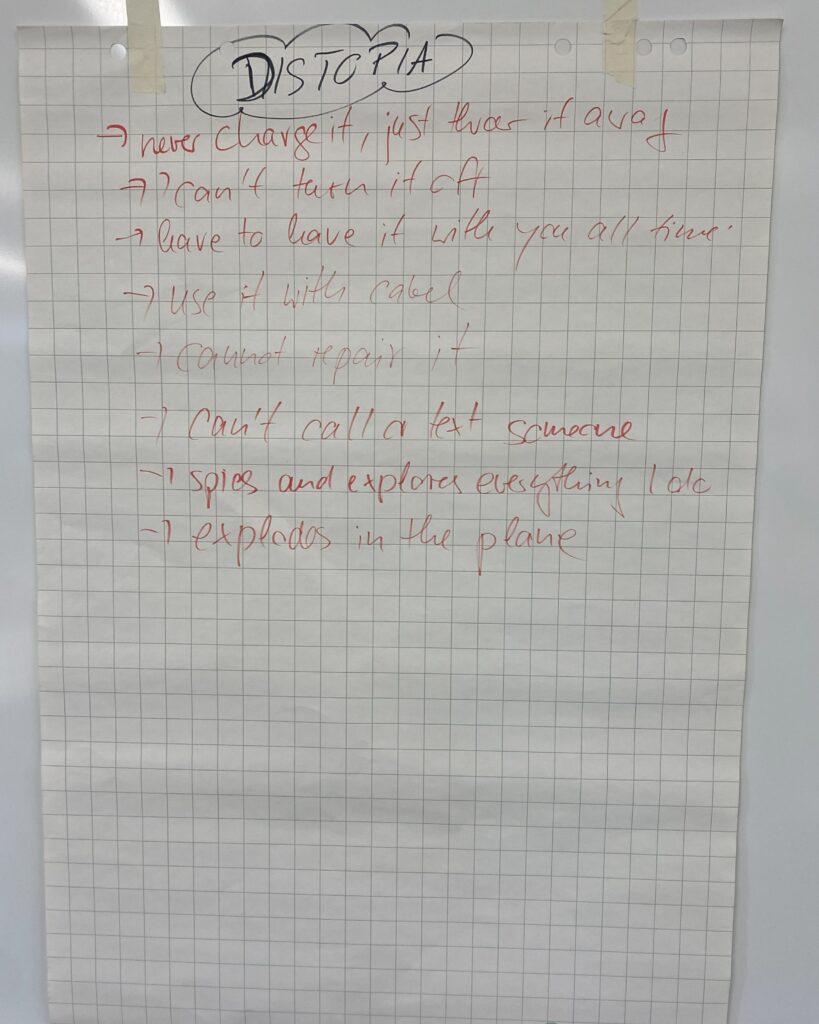
DISTOPIA:
➨ unable to recharge
➨ unable to turn off
➨ following/spying on you
➨ unable to repair
➨ unsafe, unease or inconvenient
to use
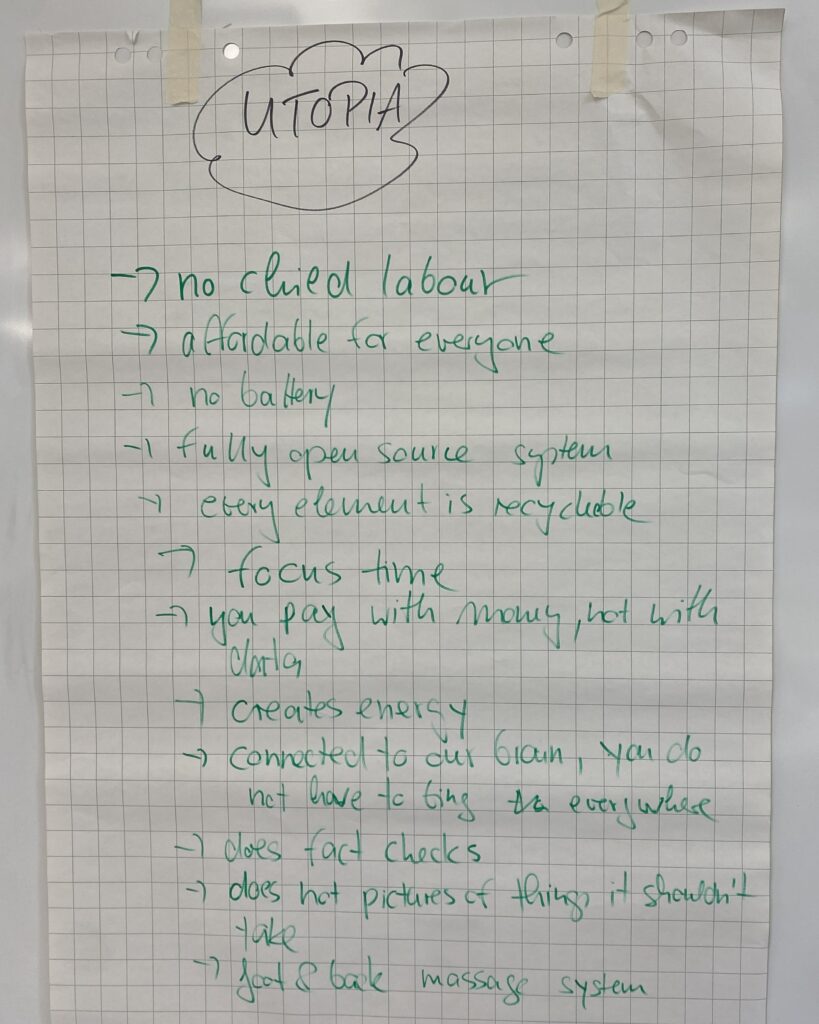
UTOPIA:
➨ produced under fair, sustainable
circumstances
➨ affordable for everyone
➨ no need to charge
➨ fully recyclable
➨ supports adaptive use
➨ upgradable/replaceable parts
➨ enforcing safe usage
(fact checks, data security,…)
Documenting an utopian future
For the last part of our session we had the opportunity to combine everything from before in documenting a glimpse into a possible ‘utopian future’.
What could life be like in a perfect society?
Here are three different scenarios, documented via three different ways:
DRAWING AN UTOPIA
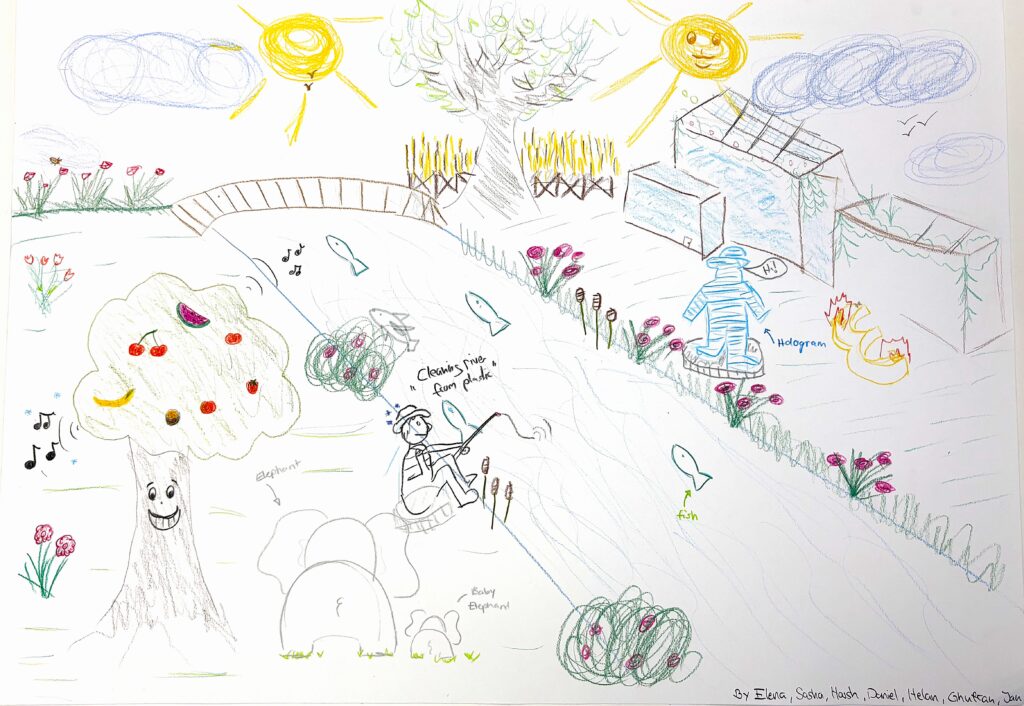
LETTER FROM OUR GRANDCHILD
"Dear Grandfather James,
I am sitting beneath a tree on my rooftop and writing this letter to you. It feels like writing on a real sheet of paper as far as I can imagine hat - you just told me about it, but I never experienced it myself. I do not need a pen or an eraser, the words that I have in my mind appear on the surface as soon as I slide over the it.
I just got that physical upgrade for my phone last week and gave the replaced parts to the recycling institute for someone else to become a new phone.
Is it really true that you had to recharge and throw away your phones? At school we had a discussion in history about that topic and we really could not imagine that this had ever been the case. We do not have to care about energy management so some of my fellow class mates didn't even know what a battery is!
This made me realize, what part you played in creating the world I live in today.
Love,
Clemagacla"
AUDIO STORY FROM THE FUTURE
Key Takeaways
The western lifestyle, as much as we have become accustomed to it, is not sustainable in its current form. If we want to preserve this planet we call home, we have to move away from comparatively short lifespan, single use and disposable products as well as inefficient design of our infrastructure. We should entertain the idea, that newer and more advanced technology isn’t always the answer to every problem facing us. We should get comfortable with the fact that low tech solutions are a valid alternative when it comes to thinking of a better future. If designed well, they are not only more sustainable, but can even help focusing again on what high tech innovations often lack these days: The true social and personal needs of every individual and of us as a society.
Our take on this weeks lesson:
Maximilian R.:
“Personally, I was already quite familiar with many of the topics discussed in this week’s lesson like longer lasting or more repairable tech, Garbage Cities and Urbanism. But the way Florian presented these things it provided mew with a new point of view to look at these topics. The Utopia-exercise was a fun, different way to think about these topics as well.”
Gabriel S.:
“I’ve never been quite comfortable with the current trend of technological advancements. Don’t get me wrong – of course I’m thankful for all the new possibilities that come along with it. But the ever-present narrative of ‘bigger, faster, stronger into the future’ just feels at least incomplete if not even harmful considering all the factors playing into society. So thinking of an utopia centred around the complex human needs instead of simply ‘growth’ gave an optimistic outlook on what we could achieve our future to be. And I really do think low-tech could and should play an important role in that. Because for me ‘low-tech’ doesn’t have to mean ‘going back to primitive technology’, no. It means ‘reducing technology to its core — again focusing on its real purpose of creating a better and therefore also sustainable future.”
Collection Of Further Information On This Weeks Topic
>> Independent association for the development and dissemination of positive visions of the future
>> YouTube channel on urbanism
>> Non-profit-organization helping rural areas to grow safe, livable and financially resilient
>> Press Release on the “Right To Repair” in the EU
Authors: Maximilian Raith & Gabriel Seibold
Leave a Reply